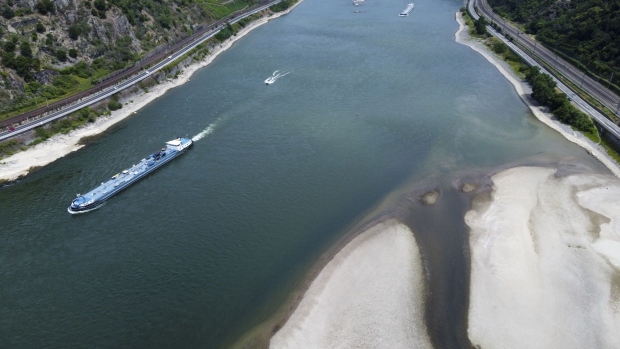Jul 18, 2022
Heat Wave Is Pushing Europe’s Energy System to the Limit
, Bloomberg News

(Bloomberg) -- A scorching heat wave is pushing Europe’s power system to the edge, testing energy policies typically geared toward meeting demand in winter, according to Lane Clark & Peacock LLP.
With the extreme heat, power production is curbed as natural gas-fired stations run less efficiently and nuclear generators struggle keep their plants cool. Warmer temperatures also impact waterways, with Germany’s Rhine river at the shallowest in at least 15 years on a seasonal basis and threatening deliveries of coal to power plants.
“A key driver and concern for those in the industry is that -- at the temperatures we are seeing across the UK and Europe -- much of the energy systems are simply less efficient and can’t deliver the normal power capacity,” said Rajiv Gogna, a partner who specializes in energy at the consultancy.
The hot weather is exacerbating Europe’s worst energy crisis in decades, due mainly to Russia’s invasion of Ukraine and subsequent sanctions on energy imports. With higher temperatures, supply may not be sufficient to meet demand in addition to the restocking required ahead of next winter, according to Rystad Energy.
Temperatures in the UK are expected to break a record of 38.7 Celsius (101.66 Fahrenheit) on Tuesday, with the mercury seen rising above 40°C in London and much of southern England. Similar records are being broken across Europe, where temperatures are forecast to go even higher.
Read more: London Braces for Hottest Night Ever Amid ‘Insane’ Heat Wave
“While much focus on energy policy for the future has focused on how we provide energy during the winter, particularly in keeping our homes warm, it must also look at the scenarios we are experiencing today, ensuring the UK has the right mix of generation for summer too,” Gogna at LCP said.
German day-ahead power rose to 397 euros per megawatt-hour, the highest since March on Epex Spot SE. Meanwhile, the French equivalent climbed to the highest since April at 521 euros.
©2022 Bloomberg L.P.





